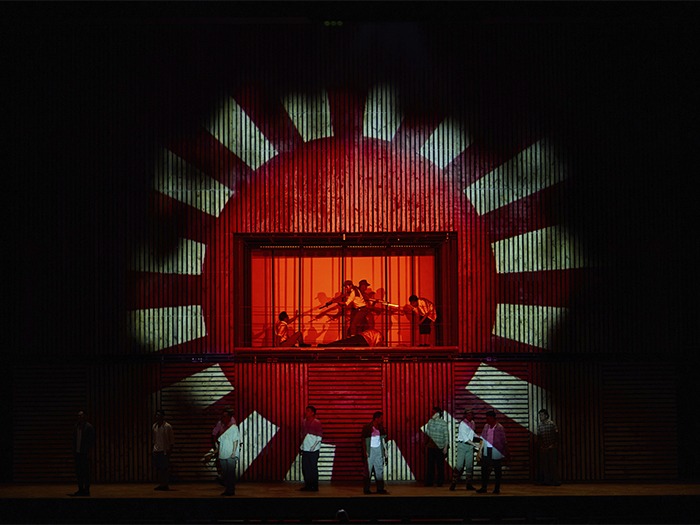Believed to be the first production in Singapore to feature Claypaky’s Tambora Batten, the revival of The LKY Musical recently concluded its run at the Sands Theatre at the Marina Bay Sands. Lighting Designer Gabriel Chan chose 24 of the high-powered, feature-rich batten fixtures to provide backlighting and effects lighting for the show, presented by Aiwei and Singapore Repertory Theatre.
The LKY Musical is one of the most successful Singaporean shows of all time and the first large-scale musical to play the Sands Theatre in more than two years. The production opened to a sold out run at its debut in 2015 and was nominated for several categories in the Straits Times’ Life! Theatre Awards, including best lighting design by Gabriel Chan.
The production is based on the life of Singapore’s founding Prime Minister, Lee Kuan Yew. It spans about 30 years from British colonial rule to WWII’s Japanese occupation to the fight for independence, which was granted in 1965. Covering that much time and so many momentous events in 150 minutes meant “the pace of storytelling had to be brisk,” noted Chan.
“The set design was a multi-storey build reminiscent of ‘The Hollywood Squares,’” he explained. “A combination of flying set flats and sliders revealed the action driving the narrative while another space was set up for the next scene. Projection design used the flown set flats and sliders as projection surfaces to deliver not just background but also information critical to the story.”
According to Chan: “as a result of the multi- surface projection design woven into the show, getting backlighting from the set design was the biggest challenge – something that as an LD, I was unable to achieve back in 2015. With a low profile and wide-angle zoom, Tambora was the perfect instrument to resolve this challenge.”
He explains that the low profile of the fixtures fit inside the set design without blocking the rear projection with their silhouettes, a real point in their favour. With an extremely short throw distance of less than three meters, a wide zoom was also required to deliver an even backlight wash on the cast inside the cubes – another capability of Tambora.
Chan “managed to squeeze” four Tambora battens into each of the six cubes, bolting them directly onto the underside of the floors of the second and third tiers.
With activity happening all the time in the cube set, the lighting design also “had the task of focusing the audience’s attention on where the action was while masking off other sections of the set that were involved with technical resets,” Chan points out. “I needed to avoid the projection surfaces as they were part of the narrative.”
Additionally, he leveraged the batten’s individual pixel control to provide a higher resolution of focus on the point of interest. “The pixel dimmer movement that I was able to achieve not only allowed a great latitude of effects that helped drive the narrative better but also permitted the lighting design to blend in more seamlessly with the projection content.”
Individual pixel control gave Chan the opportunity to create some dynamic effects that added movement to the scenes. “In a trishaw cycling sequence, where our protagonist had to rush to a certain place to deliver his rally speech, a combination of individual pixel dimming effects and a secondary layer of strobe created a very interesting stop-motion look that helped convey the idea of speed and traveling from one location to another.”
The Tambora Battens proved to be reliable and performed “brilliantly,” says Chan. “The fixtures had even colour mixing and definitely delivered a punch. I was also impressed that the LED engine was able to achieve the tungsten warmth that helped add to the look of the 1900s.”
Chan gives kudos to the logistical support he received from Frankie Yee at rental agency MediaPix. “With supply chain disruptions being so commonplace today, there was a genuine concern that the product would not ship on time for us,” Chan explained. “In fact, the Tamboras actually arrived earlier expected, so I was able to try the product at MediaPix’s warehouse before bumping in. This helped me iron out design-related decisions that I would have had to take when I arrived at the theatre. It’s been a great experience working with Tambora Battens.”


